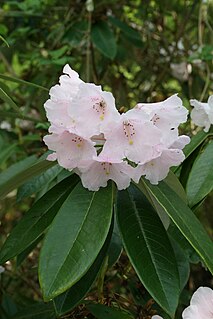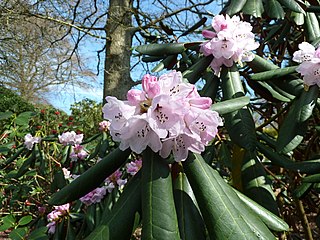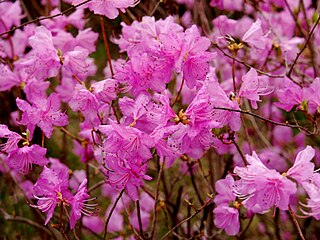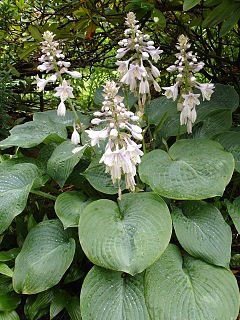
Rhododendron is a very large genus of 1,024 species of woody plants in the heath family (Ericaceae), either evergreen or deciduous, and found mainly in Asia, although it is also widespread throughout lowland and montane forests in the Pacific Northwest, California, the Northeastern United States, and especially in the highlands of the Appalachian Mountains of North America. It is the national flower of Nepal, the state flower of Washington and West Virginia in the United States, the provincial flower of Jiangxi in China and the state tree of Sikkim and Uttarakhand in India. Most species have brightly colored flowers which bloom from late winter through to early summer.

Correa is a genus of eleven species of flowering plants in the family Rutaceae that are endemic to Australia. Plants in the genus Correa are shrubs to small trees with simple leaves arranged in opposite pairs, bisexual flowers with four sepals, four petals usually fused for most of their length and eight stamens.

Acer campestre, known as the field maple, is a flowering plant species in the family Sapindaceae. It is native to much of continental Europe, Britain, southwest Asia from Turkey to the Caucasus, and north Africa in the Atlas Mountains. It has been widely planted, and is introduced outside its native range in Europe and areas of USA and Western Australia with suitable climate.

Agave parryi, known as Parry's agave or mescal agave, is a flowering plant in the family Asparagaceae, subfamily Agavoideae. It is a slow-growing succulent perennial native to Arizona, New Mexico, and northern Mexico.

Aquilegia coerulea is a species of flowering plant in the buttercup family Ranunculaceae, native to the Rocky Mountains from Montana south to New Mexico and west to Idaho and Arizona. Its common name is Colorado blue columbine; sometimes it is called "Rocky Mountain columbine," but this also refers to Aquilegia saximontana.

Abies lasiocarpa, the subalpine fir or Rocky Mountain fir, is a western North American fir tree.

Symphyotrichum lateriflorum is a species of flowering plant of the aster family (Asteraceae) native to eastern and central North America. Commonly known as calico aster, starved aster, and white woodland aster, it is a perennial, herbaceous plant that may reach 120 centimeters high and 30 centimeters across. Each flower head has many tiny florets put together into what appear as one.

Rhododendron arboreum, the tree rhododendron, is an evergreen shrub or small tree with a showy display of bright red flowers. It is found in Bhutan, China, India, Myanmar, Nepal, Sri Lanka, Pakistan and Thailand. It is the national flower of Nepal. In India it is the state tree of Uttarakhand and state flower of Nagaland.

George Forrest was a Scottish botanist, who became one of the first western explorers of China's then remote southwestern province of Yunnan, generally regarded as the most biodiverse province in the country.

Rhododendron argyrophyllum (银叶杜鹃) is a species of flowering plant in the heath family Ericaceae. It is native to forested slopes at 1,600–2,300 m (5,200–7,500 ft) in E and NW Guizhou, S and W Sichuan, and NE Yunnan in China.

Rhododendron fulvum is a species of flowering plant in the heath family Ericaceae, native to northern Myanmar and China. In China, it is found in southwest Sichuan, southeast Xizang, and western Yunnan. It grows at altitudes of 2,700–4,400 m (8,900–14,400 ft). It is an evergreen shrub or small tree growing to 2–8 m (6.6–26.2 ft) in height, with leathery leaves that are oblanceolate to oblong-lanceolate or obovate, 8–20 by 3–7.5 cm in size. The undersides are felted with a striking cinnamon colour. The flowers, borne in trusses in spring, are loosely bell-shaped, pale rose pink, with a crimson basal blotch and sometimes red spots.

Rhododendron mucronulatum, the Korean rhododendron or Korean rosebay (Chinese: 银叶杜鹃; pinyin: yínyè dùjuān), is a rhododendron species native to Korea, Mongolia, Russia, and parts of northern China. It is a deciduous shrub that grows to 1–2 m (3.3–6.6 ft) in height, with elliptic or elliptic-lanceolate leaves, 3–7 cm long by 1–3.5 cm wide. The reddish-purple flowers appear in late winter or early spring, often on the bare branches before the foliage unfurls. It inhabits forested regions at 1,600–2,300 m (5,200–7,500 ft).

Rhododendron keiskei is a species of flowering plant in the heath family Ericaceae, native to Honshu, Kyushu and Shikoku in Japan.

Rhododendron calophytum, the beautiful-face rhododendron, is a species of flowering plant in the heath family Ericaceae that is native to the forests of central and eastern China, where it lives at altitudes of 1,400–4,000 m (4,600–13,100 ft). Growing to 12 m (39 ft) tall and 8 m (26 ft) broad, it is a substantial evergreen shrub. The leathery leaves are narrow and up to 30 cm (12 in) long. In early Spring trusses of bell-shaped, white or pale pink flowers, spotted with maroon inside, are produced.

Rhododendron pachysanthum, the thick-flowered rhododendron, is a species of flowering plant in the heath family that is native to Taiwan. It is an evergreen shrub growing to 2.5 m (8.2 ft) tall and broad. This species is particularly noted for its 9 cm (3.5 in) leaves, which may be heavily felted on both surfaces, red above and brown beneath. In early spring, trusses of pale pink flowers appear, spotted crimson on the inner surface.

Rhododendron pseudochrysanthum, the false-gold-flower rhododendron, is a species of flowering plant in the heath family Ericaceae, native to Taiwan. It is a low-growing evergreen shrub growing to 2.5 m (8.2 ft) tall and broad. In spring, trusses of pink buds appear, opening to pale pink flowers spotted with deeper pink on the inner surface.

Rhododendron sinogrande (凸尖杜鹃) is a species of flowering plant in the Ericaceae family. It is commonly called the great Chinese rhododendron, is a species of flowering plant in the heath family Ericaceae, native to alpine regions at 2,100–3,600 m (6,900–11,800 ft) in southeastern Xizang and western Yunnan in China and in northeastern Myanmar.

Hosta sieboldiana, Siebold's plantain lily, is a species of hosta native to Japan. A putative variety, Hosta sieboldiana var. elegans, has gained the Royal Horticultural Society's Award of Garden Merit, as has a putative variety of its synonym; Hosta fortunei var. aureomarginata, the gold-edged plantain lily. The cultivars 'Blue Angel', 'Blue Mammoth', and 'Olive Bailey Langdon' have also gained the RHS Award of Garden Merit.

Rhododendron oreodoxa is a species of flowering plant in the genus Rhododendron native to central China. Its variety Rhododendron oreodoxa var. fargesii, called the Père Farges rhododendron, has gained the Royal Horticultural Society's Award of Garden Merit.

Rhododendron russatum, the purplish-blue rhododendron, is a species of flowering plant in the genus Rhododendron native to south-central China and Myanmar. It has gained the Royal Horticultural Society's Award of Garden Merit.




















